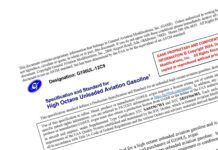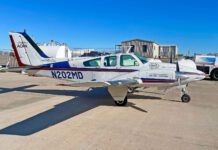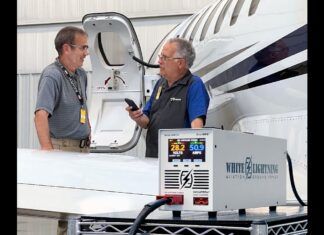UNLEADED AVGAS: EAGLE’S DISINFORMATION CAMPAIGN
The State of California is now fully aware that there is a viable, FAA-approved unleaded avgas—G100UL—and, from what I’ve learned from multiple sources, is demanding that it be sold at all California airports by the end of this year. That’s great news to pilots and especially to FBOs in California that are subject to a lawsuit requiring that they sell the lowest lead commercially available avgas or be subject to sanctions. They now have a way to avoid potentially millions in court-ordered sanctions if they keep selling 100LL.
One would think that the folks at EAGLE (Eliminate Aviation Gasoline Emissions by 2030) would be delirious with success and hanging “Mission Accomplished” banners on tankers hauling unleaded avgas across the nation. Sadly, perhaps EAGLE recognizes that if it declares victory and admits it did what it was supposed to do—get a 100 percent drop-in unleaded avgas to general aviation pilots—before 2030, it’s out of business and will miss out in millions in federal money. Accordingly, EAGLE, through its members, initially stalled, offering vague excuses about additional testing for G100UL (to “build confidence”) even though it went through 12 years of testing by the FAA and further testing by the two largest OEM airframe producers who reported no issues in their flight testing. Then EAGLE members started an active disinformation campaign against G100UL, asserting that because it was FAA-approved and had an FAA spec, that it was not satisfactory unless it also had an ASTM (American Society for Testing and Materials) approval and spec. Some EAGLE members made false statements that FBOs would only be protected from liability in a lawsuit regarding avgas if the avgas had an ASTM spec. I learned that one went so far as to falsely state that it’s illegal to sell an avgas that doesn’t have an ASTM spec.
Those are lies. The FAA has long recognized that there are two methods of getting an avgas approved: via the FAA or via ASTM coupled with more FAA testing. One is not better than the other or preferred. It is not illegal to sell avgas that has an FAA approval/spec and not an ASTM approval/spec—just as it’s not illegal to sell an avgas that has an ASTM approval/spec and not an FAA approval/spec.
Having an ASTM approval/spec will not protect the seller of avgas from legal liability just as having an FAA approval/spec won’t. I retired after practicing aviation law for 42 years, much of it defending aircraft and component manufacturers. The fact that a product—airplane, landing gear, avgas—met a spec or received federal approval does not prevent the manufacturer or seller of that product from liability in a lawsuit. The issue is whether the product was defective or was negligently designed and/or manufactured. Compliance with a particular standard or spec is just one piece of evidence the jury may consider in determining liability. ASTM approval is not a get out of jail free card—just as FAA approval isn’t. A lot of aviation manufacturers have been found liable for products they sold that met ASTM and/or FAA specs.
Further evidence of EAGLE’s unwillingness to work toward success is that two of the EAGLE participating fuels, Lyondell/VP Racing and Phillips 66/Afton Chemical, contain manganese—which has long been unacceptable in fuel because of combustion chamber and spark plug deposits. Why didn’t EAGLE call foul immediately? EAGLE should never have accepted either fuel into a taxpayer program. Not surprisingly, those fuels have recently been withdrawn to be “reformulated.” It sure looks like petroleum giant Phillips is now getting a government subsidy to do its R&D via EAGLE. This has been raising the question—who is EAGLE working for, the oil companies or aircraft pilots/owners?
I keep thinking of the phrase used by the FAA’s Office of the General Counsel when it evaluated a long-delayed project: “The FAA now expects to see conspicuous progress.” Fortunately, all “conspicuous progress” accomplished thus far was by private enterprise. From where we sit, EAGLE’s actions are years away from a similar description. In another opinion piece in our April 2023 issue, we suggested, tongue in cheek, that because of continued foot-dragging, EAGLE change its name from a glorious soaring bird to what it really is, a flightless one—KIWI, Keep Industry Waiting Indefinitely. I renew that recommendation.
I also call on AOPA and EAA to evaluate their posture in the EAGLE process to make sure that they are truly supporting their members who need unleaded avgas and not organizations trying to delay its implementation out of what seems like misguided self-interest. —Rick Durden




